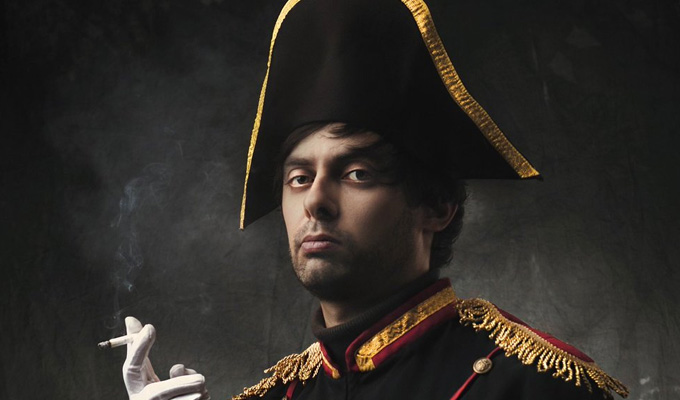Ten years he’s looked haughtily down his nose at us, but Marcel Lucont always gets welcomed back to the Fringe for more self-absorbed chansonniering, jazz philosophy and the occasional Gallic shrug, almost like us Brits are fixated with lazy French stereotypes. Talking of which… Alexis Dubus’ preposterously French alter-ego has taken on an added piquancy post-Brexit and it’s an angle he plays cleverly in this fine late-night show and first residence at Pleasance Forth.
Lucont, of course, is the character that once fooled a teenage reviewer into thinking he was real. A crying shame for the credulous newcomer, naturally, but also a credit to Dubus, whose possession of the character is complete, as he demonstrates again here. It might not be terribly du jour to be stereotyping our neighbours like this, but the stereotype is terribly en pointe. Affectionate too, and Dubus is smart enough to work some meta-references into Lucont’s patter.
In fact, ‘smart’ is probably the best way to describe most of this. His gag about French arrogance is the kind of witticism that should win Dave’s Joke of the Fringe but never would, because a.) it’s too sophisticated, and b.) needs delivered like Dubus does here. His songs and poetry are strong and all the better for the way he carps at and belittles his accomplished band while they play. You see, this isn’t the seventeen piece French orchestra he’d envisaged, but trois rosbifs. That’s all he had the budget left for.
The evening loses some momentum during the jazz-backed conversational section with the crowd. It’s particularly bad tonight as the random selections from the audience prove to be either obstructive or otherwise difficult to work with. Dubus works hard and carves his way out of it with wit and flair. Even with a fair wind though, it feels like it might get repetitive.
Things pick up again afterwards. He can’t help but comment on the Notre-Dame fire, part of what you might term the ‘ecclesiastical’ section of the set. Lucont then finishes with an anthem to Brexit, a topic few aren’t sick of, but for Lucont it has relevance, and this rather affectionate closer is judged well enough to amuse either side of the debate. You can’t say that very often.
For a character that could’ve dried up long ago, Lucont has proved surprisingly durable. Dubus has made sure he’s not a one-trick pony, a cheap dig at the French. There are extra dimensions to him, the writing has art and intelligence to it, and Brexit gives him a renewed raison d’être. With typical ego, his blurb says he’s at the height of his imperial phase, but it would be churlish to disagree.
